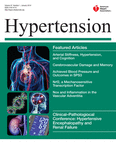 Anna Ahimastos, a heart researcher who faked patient records, has notched her 7th retraction.
Anna Ahimastos, a heart researcher who faked patient records, has notched her 7th retraction.
One more paper is expected to be retracted, according to a spokesperson from her former institution, the Baker IDI Heart & Diabetes Institute in Australia.
As with the other retractions, the 2005 paper in Hypertension — about how the hypertension drug ramipril may help alleviate cardiovascular disease — is being pulled after Ahimastos admitted to scientific misconduct. She asserts the data remain valid, and has not signed the retraction notice.
The Hypertension paper has been cited 63 times, according to Thomson Scientific’s Web of Knowledge. Here’s the retraction note in full (the language will be familiar to readers who have been following this case):
The article, “Ramipril reduces large-artery stiffness in peripheral arterial disease and promotes elastogenic remodeling in cell culture” by Ahimastos et al (Ahimastos AA, Natoli AK, Lawler A, Blombery PA, Kingwell BA) has been retracted. The article was published in Hypertension (2005;45:1194–1199. doi: 10.1161/01.HYP.0000168945.44069.aa) online on May 16, 2005 and in print in the June 2005 issue of the journal.
The authors wish to retract the above article based on inadequate validation of primary data sources and data misrepresentation. An independent review of the study data was conducted following an admission of scientific misconduct by the first author, Dr Ahimastos, related to another study in peripheral arterial disease (Ahimastos, JAMA, 309(5):453–460, 2013). This resulted in a decision by the authors to retract the article, although the retraction has not been signed by Dr Ahimastos, who maintains the integrity of the data and validity of results. The other authors were not involved in any misconduct and apologize unreservedly to the editors, reviewers, and readers of Hypertension. Given the current indications for ramipril, we do not believe that there has been any negative clinical impact on patients.
Ahimastos’s first retractions, a JAMA trial and a sub-analysis, were pulled in September at the request of her co-authors. An investigation turned up problems in five more publications, including another one from JAMA and the Annals of Internal Medicine.
Ahimastos’s data on ramipril have conflicted with those from others. As we’ve noted before, a JAMA editorial offered a counter example to the result from her clinical trial:
Prior trials of ramipril therapy to improve walking performance in patients with intermittent claudication have yielded mixed results. A previous randomized controlled trial of ramipril vs placebo by Ahimastos et al involving 40 patients with symptomatic infrainguinal PAD and no history of diabetes or hypertension demonstrated gains in painfree and maximum walking distance of 227 and 451 seconds, respectively, compared with placebo. However, a recent meta-analysis by Shahin et al of 4 randomized trials involving 137 patients with PAD, including the 40 participants in the prior trial by Ahimastos et al, demonstrated no association between use of angiotensin-converting enzyme (ACE) inhibitors and improved walking performance.
We’ve been unable to get in touch with Ahimastos.
Hat tip: Rolf Degen
Like Retraction Watch? Consider making a tax-deductible contribution to support our growth. You can also follow us on Twitter, like us on Facebook, add us to your RSS reader, and sign up on our homepage for an email every time there’s a new post. Click here to review our Comments Policy.
Hmmm. And she’s listed as a sub-investigator on a study that’s currently recruiting. (Search her name on clinicaltrials.gov)
https://clinicaltrials.gov/ct2/show/NCT01799057